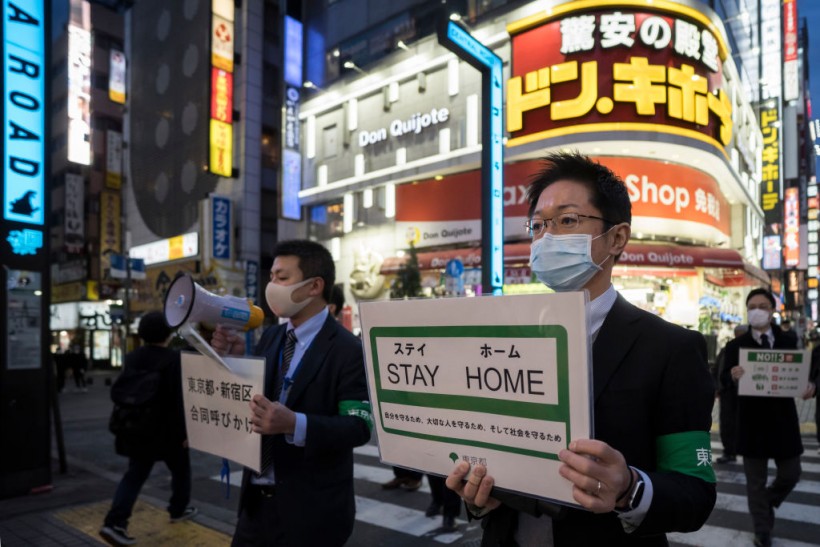
(Photo : Getty Images/Tomohiro Ohsumi)
TOKYO, JAPAN - APRIL 11: Staff members of the Tokyo metropolitan government wearing face masks hold signs as they call people to stay home in the Kabukicho entertainment area on April 11, 2020 in Tokyo, Japan. Tokyo Governor Yuriko Koike has requested that businesses including schools, athletic facilities, bars and restaurants to temporarily close or operate under reduced hours. The action follows a state of emergency that covers 7 of Japans 47 prefectures as the Covid-19 coronavirus outbreak continues to spread throughout the country.
Japan would provide free COVID-19 vaccines to all of its citizens under the passing of a bill on December 2 as the nation tackles record numbers of daily cases. According to the bill, the government will cover all vaccine costs for the country's 126 million residents and was approved by the parliament's upper house, having cleared the powerful lower house.
Free COVID-19 Vaccines For Japanese Citizens
Japan has recorded 2,100 fatalities and 150,000 novel coronavirus cases. Recently, the nation has been registering record numbers of cases daily in various regions.
The revision of the current vaccination law was following Prime Minister Yoshihide Suga's vow to secure coronavirus vaccines for all country residents in the first half of 2021.
Japan has agreed with United States pharmaceutical company Pfizer Inc., American firm Moderna Inc., and the United Kingdom's AstraZeneca Plc. to receive adequate vaccines for 145 million people when they are successfully developed. This would allocate a budget of 671.4 billion yen ($6.4 billion) for that designation, reported Bangkok Post.
The Japanese government has allocated a budget of 671.4 billion yen (6.4 billion US dollars) for the COVID-19 vaccination, indicated by the media in Japan.
The revised bill does not clarify whether the law would also enable foreign residents in the nation to be administered free vaccination, reported Xinhuanet.
In the fast-moving race across the globe to create vaccines to combat the pandemic, Pfizer and its German development partner BioNTech SE have recently filed for approval in the European Union after their application to the United States and Britain.
Also Read: Tucson City Implements Mandatory Nightly Curfew To Mitigate COVID-19 Prevalence
On Wednesday, Britain became the first country to approve Pfizer-BioNTech's vaccine candidate. It would be delivered next week across the nation.
Japan has fixed vaccine candidates for 60 million people from Pfizer and for 25 million people from the biotech company Moderna. Japan has also confirmed it would administer 120 million doses of AstraZeneca's vaccine.
The bill would make the local officials of Japan responsible for overseeing the inoculation across prefectures.
The implementation arrives at a time when Japan is experiencing a second wave of respiratory illness.
Pfizer and Moderna are applying for emergency use approval following the results of clinical tests displaying their shots were effective.
The bill's passage arrives two weeks following Japan's prime minister's announcement that the nation was on "maximum alert" over the virus. Medics are cautioning that hospitals are on the brink of downfall.
Japan has so far not implemented restrictive quarantine periods. However, authorities recently prompted residents to limit non-essential travel. Businesses serving alcohol were also advised to close early. The recent rise in cases also resulted in the suspension of a tourism campaign designated to help shore up the global health crisis's aggravating economic downturn.
Health ministry authorities have indicated they expect foreign residents to be covered based on other vaccinations proffered for free.
The Japanese government is required to collect data on the efficacy and safety of vaccines under development. Some vaccines apply artificial genes and other technologies that have not been used beyond a laboratory setting.
Despite the law indicating people to be immunized, the government would allow individuals to decline to be administered if the vaccines have not been proved adequately safe by their approval.
Related Article: Australia's Economy Emerges From COVID-19 Recession by 3.3%








